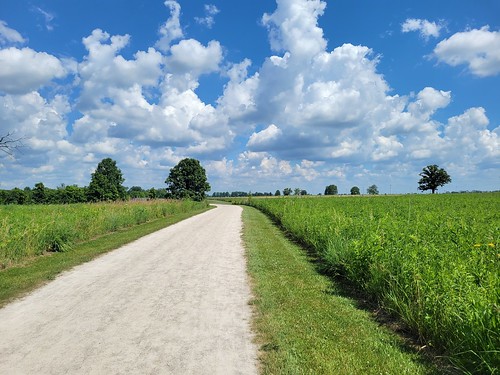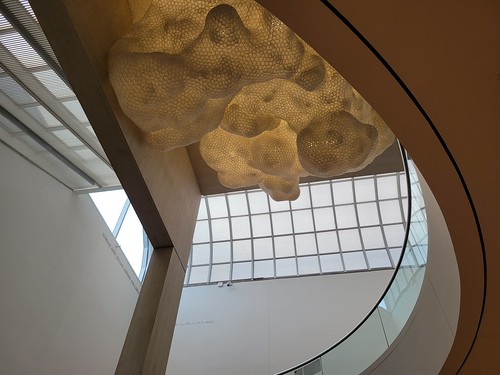
This morning while doing my morning kitchen chores, I heard part of an NPR story about women long-haul truck drivers. Several of the women who were interviewed had become truck drivers in midlife, after escaping other jobs or abusive relationships. Although life on the road is lonely for women truckers, the story explained, these particular women found clarity and solace in a job that gives them lots of uninterrupted time to think.
“Windshield time” is the term the story used for the solitude drivers experience on the road. While driving for long distances, the women in the story had time to reflect upon their lives and decide their next steps. Steering a truck was a way for them to take control of their own lives: instead of asking Jesus to take the wheel, these women found agency and clarity in an occupation they never intended to pursue.
Early tomorrow morning I’m driving to visit my Mom in Ohio: my usual summer visit. In the years leading up to the pandemic, I’d fly to and from Ohio, but last year I decided to avoid angry people on planes and the threat of flight cancellations by driving my own car to Ohio and back: something I regularly did when I was younger.
I enjoy driving, especially after the hectic preparation leading up to any trip. For the past week or so, I’ve distracted myself with packing lists, to-do lists, and all the loose ends I need to tie up before being gone for almost a week. Tomorrow morning when I pull out of my driveway, however, all the planning will be done: anything I forgot to do before leaving will somehow wait until I return.
In the meantime, I’ll have approximately twelve hours of windshield time to scan for good radio stations, listen to audiobooks, and watch the land gradually flatten beneath a widening sky.

Just over a week ago, on the same day my social media feed blew up with gut reactions, primal screams, and hot takes from the official announcement that the Supreme Court had overturned Roe v. Wade, I was on a hospital gurney, waiting for a diagnostic colonoscopy after a positive Cologuard test.
Although I’ve spent the past month telling myself the test results were either a false positive or “just” indicative of benign polyps, I’ve also been nursing a lingering sense of dread. What if I have cancer? What if the cancer has spread? What will I do in the aftermath of a dire diagnosis: what might treatment look like, and why me, why now?
I’ve never been pregnant, and I’ve never had a pregnancy scare: like Terry Tempest Williams, the only thing I’ve done religiously my entire adult life is keep a journal and take birth control. But I’m guessing quietly worrying you might have cancer is similar to quietly worrying you might have an unwanted pregnancy. In both cases, you fear something growing inside you might end or upend your life.
One of the first things my gastroenterologist did before starting the procedure was ask me to sign a consent form. Nobody can force a patient to undergo cancer screening or even cancer surgery: had I wanted to ignore my Cologuard results, that would have been a bad decision, but it would have been my right.
Because we assume grown adults have the right to make their own medical decisions, nobody can force a person to eat a healthy diet, quit smoking, or give blood, even if doing so would save another’s life. Even after we die, nobody has the right to harvest our organs without our consent. But with the stroke of a pen, the Supreme Court erased the right to bodily autonomy for women across the country. If you’re a woman of childbearing age living in a red state, what happens in your body is now the government’s business, not your own.
In the month leading up to my colonoscopy, I told only a handful of friends and relatives. I didn’t share my fears on social media, and I didn’t blog about them, either. I chose, in other words, privacy over publicity. Roe v. Wade argued that women have the right to make the most intimate of decisions about their health and families privately, without government interference. As soon as a woman begins to show, however, everyone has an opinion about her pregnancy: whether a pregnant woman likes it or not, her personal decisions suddenly become political.
During my colonoscopy, my gastroenterologist found and removed four polyps, each a clump of cells that could be benign, cancerous, or precancerous. While I waited for my pathology results, I realized the world of difference between cells that are precancerous and those that are cancer: the difference between an acorn and oak, zygote and child.
It doesn’t matter what your or my personal beliefs about abortion are: medical decisions are each individual’s personal business. Earlier this week, I got my pathology report: all four polyps were precancerous, not cancer. I dodged a bullet when it comes to my personal health, but I still have dire concerns about the American body politic. A court that ignores precedent to strip away rights is a threat to democracy from within.


















